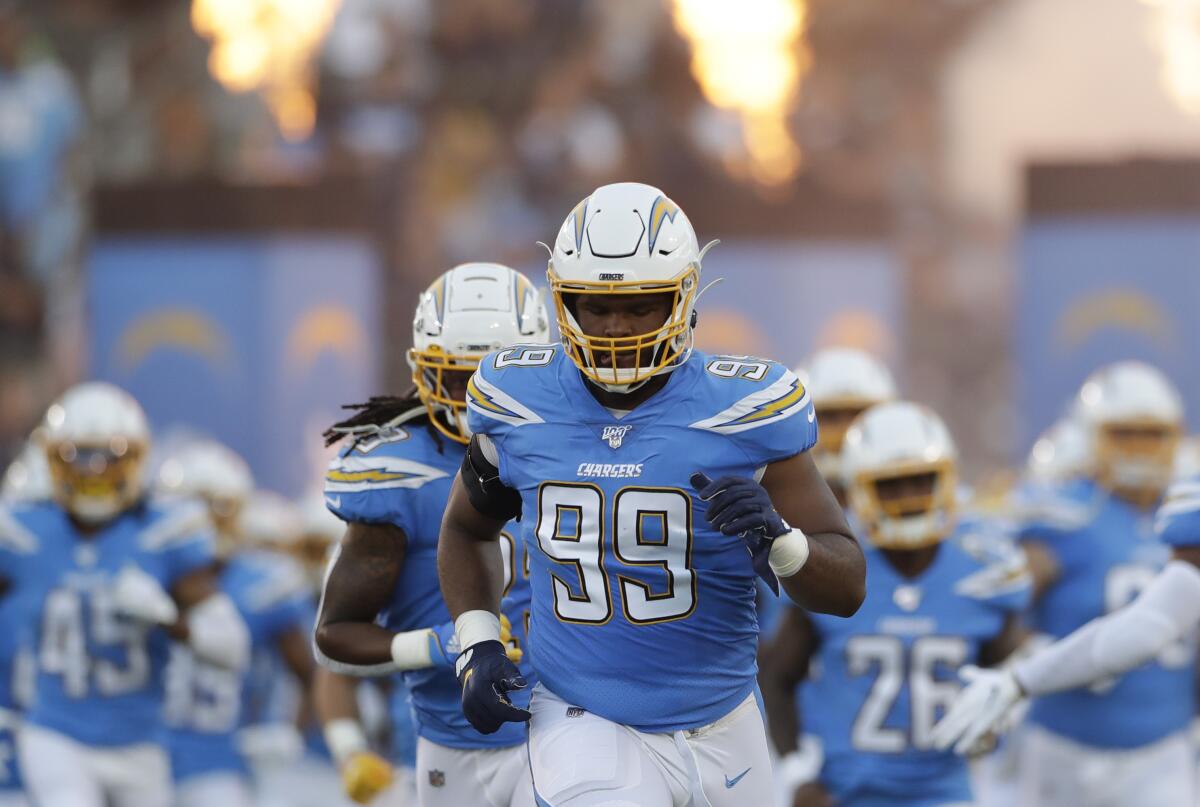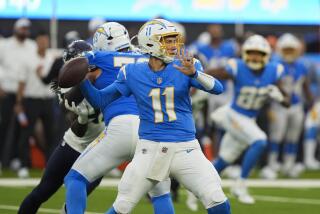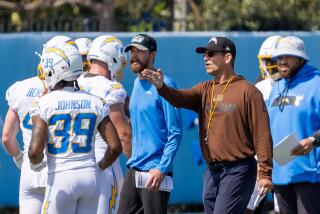Chargers’ first-round pick Jerry Tillery goes from ‘gumpy’ to gamer

- Share via
They met in 2015, and the first impression made by Jerry Tillery was not the same one Jerry Tillery generally makes today.
Now, he’s a 6-foot-6, 295-pound looming defensive presence the Chargers probably couldn’t be any more excited about having on their roster.
But four years ago?
“I think initially he was just kind of gumpy, goofy because he was a big dude,” Chargers teammate Isaac Rochell said. “He moves so well that when you see a big guy moving that well, it just looks weird.”
Ah, gumpy? Is that a word?
“I don’t know,” Rochell said, smiling. “If it isn’t, it still describes what Jerry was when I first met him. You know, I probably shouldn’t say that. Now the headline is: Rochell calls Jerry ‘gumpy.’”
That won’t be the only headline Tillery makes in 2019 if, as projected, he emerges as the most significant piece the Chargers added in the draft.
They used their first-round pick — No.28 overall — on a long and athletic tackle they expect to clog the run and stalk the quarterback.
“We really like the progression that he’s made,” defensive line coach Giff Smith said. “It’s early in the process. But, being drafted in the first round, we have a significant ceiling that we see him getting to.”
Rochell, also a defensive lineman, was a junior at Notre Dame when Tillery arrived. Born in Shreveport, La., Tillery had committed to the Irish before his junior year of high school. At that point, he was playing on the offensive line.
But in college, he established himself as one of the nation’s top defensive linemen, one whose wingspan grew to nearly two inches longer than that of Joey Bosa.
During his senior year, Tillery had eight sacks, four of which came in one game against Stanford. Afterward, Notre Dame coach Brian Kelly proclaimed, “You can’t block him one-on-one.”
“He’s gotten way better,” Rochell said. “If you’d have asked me when I was a senior and he was a sophomore was he going to be the 28th overall pick, I would have said, ‘Ah, we’ll see. Maybe.’ But now he’s just come into his body.”
Tillery left that Stanford game last season with more than just a share of the single-game school record for sacks. He also suffered a damaged shoulder, one that eventually would require surgery.
It was late September and the Fighting Irish were 5-0. While that sounds encouraging, it also meant they still had seven more games in the regular season and at least one in the postseason.
Tillery already was being projected as a top NFL prospect at a time when it’s not unusual for a player to leave his college team if it is in the best interest of his pro career. Even healthy players have skipped bowl games.
“He was in pain, no doubt,” said fellow Chargers rookie Drue Tranquill, who also played at Notre Dame. “But he’s a guy who just loves the game, loves to compete and contribute. He wasn’t going to come off the field.”
So Tillery kept playing and practicing. He was limited only in the amount he could do in the weight room.
He called getting surgery during the season “a nonstarter.” He put off the procedure until after the Fighting Irish advanced to the College Football Playoff and lost to Clemson in the semifinals.
“Outside of him getting it taped,” Tranquill said, “no one could really tell anything was wrong.”
With Chargers general manager Tom Telesco having identified Tillery as their possible top pick, the scouts and coaching staff began dissecting film.
Though his statistics did dip after the Stanford game, Tillery continued to be productive and mask the fact that he wasn’t healthy.
“Honestly, I could not see where it hindered him,” Smith said. “I think that alludes to the toughness that’s in him.”
Tillery was held out of the Chargers’ offseason program and much of training camp before he made his debut in the second preseason game.
Shortly after entering against New Orleans, he badly beat offensive lineman Nick Easton and sacked Taysom Hill, who would go on to win the game in the second half — largely because of his elusiveness.
“I think I’m quick off the ball,” Tillery said. “I have great technique, and when I approach the lineman, I have a big arsenal of tools that I use to my advantage and I am successful with.”
After the sack, Tillery stood and pumped his right fist in an animated display that officially marked his NFL arrival.
Though demonstrative, the move was muted compared with the one Tillery uncaged after one of his sacks in that Stanford game.
Tranquill remembered Tillery double-fist pumping and screaming toward the South Bend sky in a manner he called “kind of Hulkish” as teammates converged on him.
“It was just a massive sack,” Tranquill said. “He got up and did his trademark celebration. From then on, it just stuck. I’ll always remember the energy of that sack.”
It’s an energy the Chargers would welcome this season.
More to Read
Go beyond the scoreboard
Get the latest on L.A.'s teams in the daily Sports Report newsletter.
You may occasionally receive promotional content from the Los Angeles Times.







